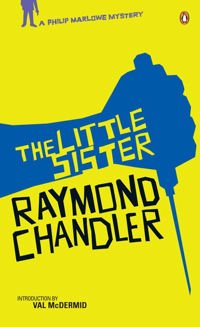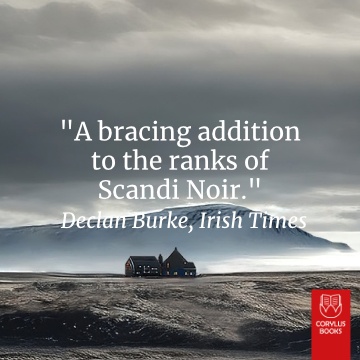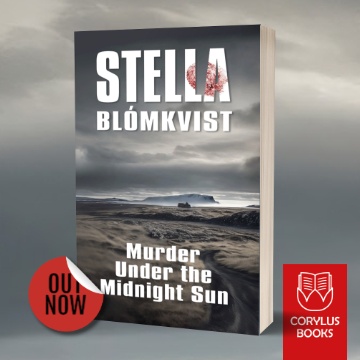 Philip Marlowe is one of the definitive hardboiled detectives, with few equals in crime fiction. Nevertheless, The Little Sister is hardly Raymond Chandler’s definitive Marlowe novel. Other novels such as The Big Sleep, The Long Goodbye and Farewell, My Lovely are better-known, perhaps because of more successful film adaptations. The Little Sister became 1969’s Marlowe, a film starring James Garner and best remembered as a sort of prologue to the actor’s television fame on The Rockford Files.
Philip Marlowe is one of the definitive hardboiled detectives, with few equals in crime fiction. Nevertheless, The Little Sister is hardly Raymond Chandler’s definitive Marlowe novel. Other novels such as The Big Sleep, The Long Goodbye and Farewell, My Lovely are better-known, perhaps because of more successful film adaptations. The Little Sister became 1969’s Marlowe, a film starring James Garner and best remembered as a sort of prologue to the actor’s television fame on The Rockford Files.
James Garner notwithstanding, The Little Sister deserves attention. While it may not quite reach the heights that other Raymond Chandler novels do, The Little Sister offers unique insights into Philip Marlowe and the hardboiled hero. Arguably, The Little Sister is important because there is no corresponding image of Marlowe from film. No-one is likely to read the Little Sister and imagine Humphrey Bogart. The Philip Marlowe that emerges from this novel is a less admirable, less secure character. The Little Sister’s Marlowe, however, is a character more deserving of a place in the noir canon than Bogart’s more familiar Golden Age portrayal.
The book offers us many of the conventions that we might expect to see in a hardboiled novel or a film noir derived from it. The story opens when a damsel in distress walks into Philip Marlowe’s office. The case won’t be closed until Marlowe runs up against blackmailers, femmes fatale, crooked doctors, Hollywood heavies, tough-nosed cops and mobsters. The Marlowe we remember has done all this and more. He’s maintained a wary skepticism and always had a bon mot we could quote admiringly, even if we don’t remember the context of the epigram.
But Bogie isn’t the protagonist here – Marlowe is. You’ll notice some similarities. And you’ll also observe some pretty stark differences. Marlowe isn’t very cool in The Little Sister. He’s down on his luck, drinks too much and shades the truth. His rapier wit is in place, to be sure. But observe how he uses it. Marlowe doesn’t go around dispensing eloquent quips because he’s practicing for a cocktail party. His jibes are a defense mechanism. Against the client whose money he needs, against the cops who can beat him with impunity, against mobsters far more powerful than he is. Sure, we know Marlowe runs his mouth. The Little Sister reminds us that he does it because he doesn’t have much in the way of firepower.
Raymond Chandler wrote novels about a detective. He didn’t write novels about detection. Marlowe’s powers of deduction do not begin to rival those of Lord Peter Wimsey or Hercule Poirot. The Little Sister suffers from Chandler’s well-known challenges with plotting. The central plot is more or less explained in a long monologue by Marlowe at the end – a practice Chandler scoffed at in The Lady in the Lake. Chandler isn’t one to foreshadow and drop red herrings and carefully pace his work until the conclusion ties it all up neatly.
Instead we get the mulishly cynical Philip Marlowe and atmosphere in spades. And Marlowe solves the case in the end not because he’s particularly brilliant, but because he hung on. Some would question whether a hero like Marlowe is properly part of noir, or whether PI fiction is its own genre. I would submit that Marlowe can be as noirish as anything Cain or Thompson ever wrote. Fetid appetites and self-aggrandising schemes run all through The Little Sister.
Philip Marlowe doesn’t resist getting caught up in the moral undertow because he’s particularly conscientious. No, Marlowe escapes ruin because of his vices. He refuses to profit from a Hollywood racket or partake in a gun moll’s lust. He isn’t virtuous; he’s just too stubborn to give them what they want. He doesn’t set the world to rights. He just stays alive long enough to see the unscrupulous destroy themselves.
“But down these mean streets a man must go who is not himself mean, who is neither tarnished nor afraid,” said Chandler. There are plenty of mean streets to be had in The Little Sister. Marlowe is frayed, jaded and cross. But he isn’t mean. He’s neither tarnished nor afraid. He’s too stubborn to be any of these.








When Marlowe says that Orfamay had declined to talk about her sister Leila, Orfamay says she can’t remember having said anything about her. That makes two of us, Orfamay. Leila is never mentioned before that. I think Chandler confused Leila with Leica, Orrin’s camera. Why isn’t this hole in the novel, central to the plot, noticed by the novel’s many reviewers, including the one on this site?
Ian, I have never been able to work out who really killed Lloyd Siverman at his house that forms the final scene of the book. Dolores tells us that Orfamay did it when she got the money in blood-stained handkerchief, but as she gets killed by her old boyfriend the good Doctor we don’t know if she was telling the truth or not and I sort of thought it might have been Leila, and it is to stop her career being ruined that she gets away with it. I don’t think that Orfamay shot him even if she had the same scheming character that her brother had developed. I wish I knew. What did you think?
I paged back and forth scratching my head for a good twenty minutes before deciding to imagine a missing scene in which Marlowe called someone in Manhattan, Kansas for family records. Early on, he suggests it would be easy to find out about Orfamay’s family if he wanted to. Glad I wasn’t the only one confused.
Yes! I kept looking to see any mention of “Leila” and found none. And wasn’t Mavis described as being around 21, which would make her YOUNGER than Orfamay?
Had the same confusion when I’d first come across Marlowe referring to Leila. I usually read carefully and don’t miss such details. So I went back and reread the previous scenes with Marlowe and Orfamay. To be doubly sure I looked up the free online ebook and scanned for the first mention of Leila. Only then-and keeping in mind Marlowe’s image of a blonde Orfamay just before he left for Van Nuys-did I proceed further, half guessing that Marlowe was trying to trick Orfamay into confessing that she was doubling as Mavis Weld. But later realized that part of Chandler’s charm is avoiding being obviously plotty even at the expense of leaving loose ends.
I was just mulling over whether to download The Little Sister on Audible and your review has swung it for me, so thank you for that. I’ve read a lot of Chandler’s novels over the decades, some twice or thrice: you can always extract another nugget from a good read! Lately I’ve taken to revisiting them in audio and here Audible has really come up trumps: the narrator of the Marlowe books, one Ray Porter, delivers about the best American readings I’ve ever heard, an absolute delight. No idea who he is and if you click on his name in Audible up come a host of (to my mind) indifferent titles, again, never heard of and arousing no interest. What a waste! This guy should be reading a host of American classics, not cornered off into some niche!
I disagree with your comment that Marlowe’s powers of deduction don’t match those of a Poirot or Lord Peter Wimsey. Even if he does sometimes reel them off in a hurried monologue at the end, at least they’re plausible and intelligible. There’s no comparison between Chandler and Agatha Christie or Sayers, whose detectives are in the know while the reader is not allowed to be. Oh, and Chandler writes good, witty prose, which those two old biddies absolutely don’t. I say this as a Brit, btw!
Consider that the brother’s blackmailing of his Hollywood sister may not have been his first run around the block. What if he had (or was currently) blackmailing his Kansas sister, too. Little sister’s behavior around Marlowe is reason to think she may have given brother some blackmail material. Blackmail would give the little sister another reason to do away with her brother, and she certainly wouldn’t tell Marlowe about it, would she?